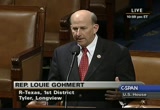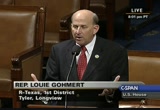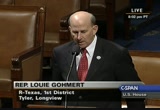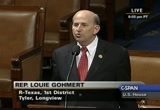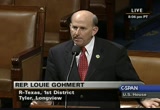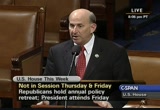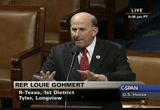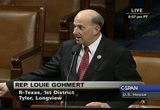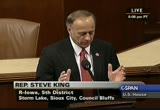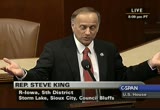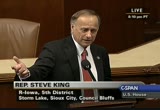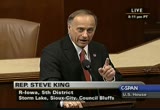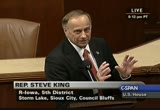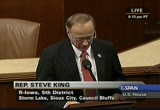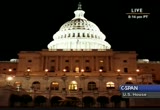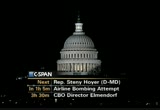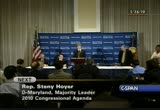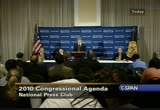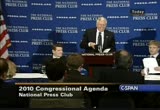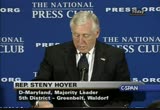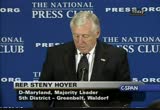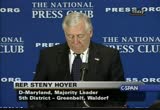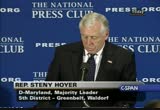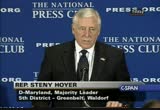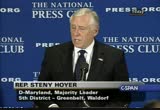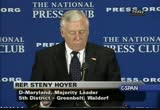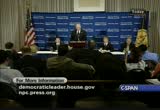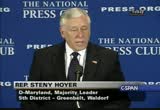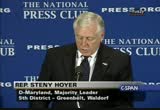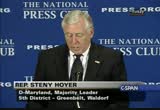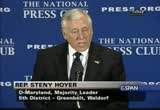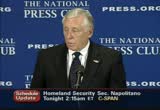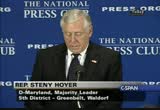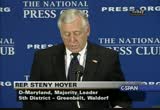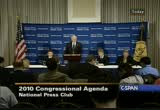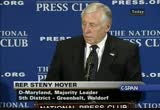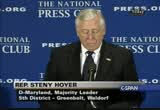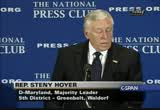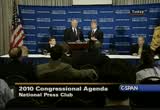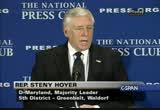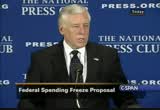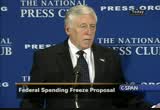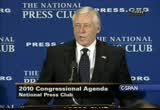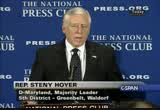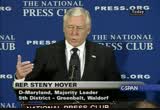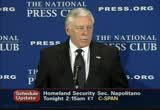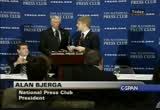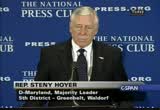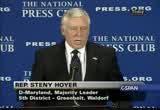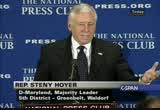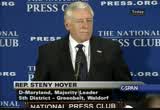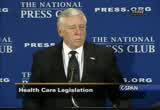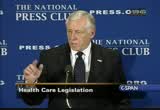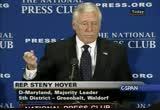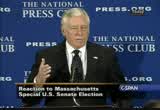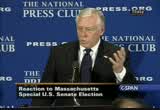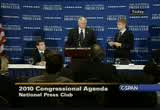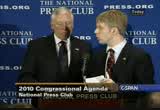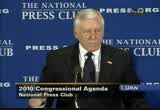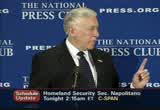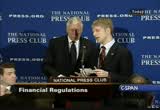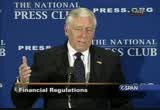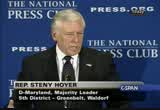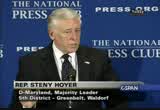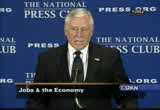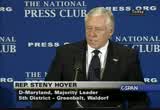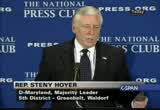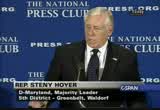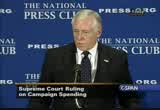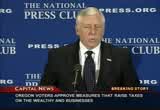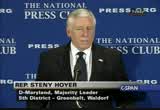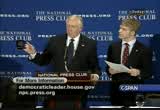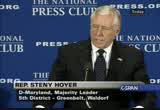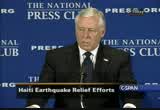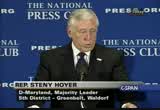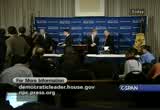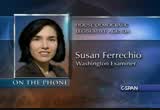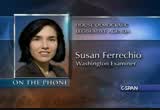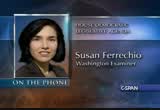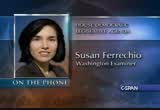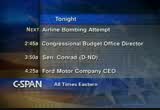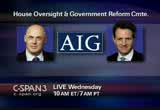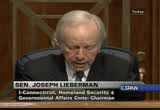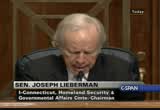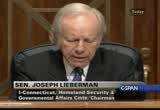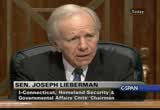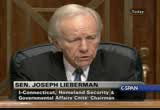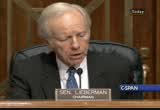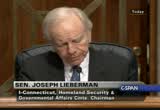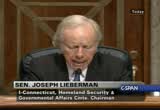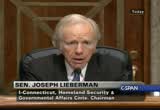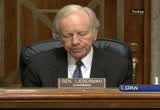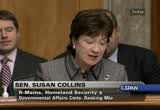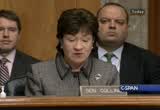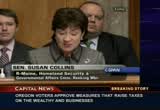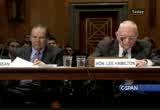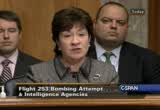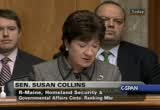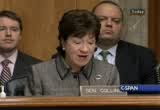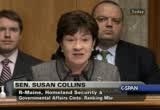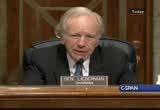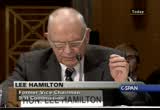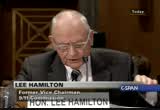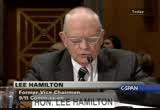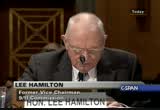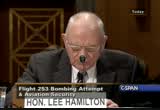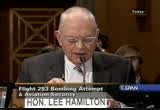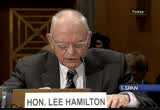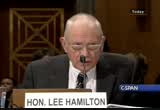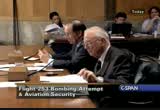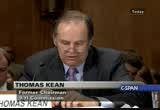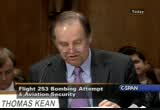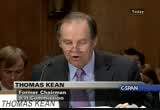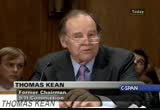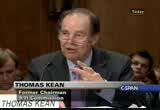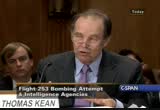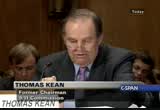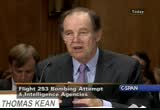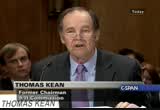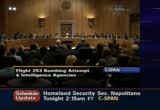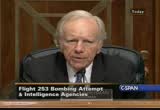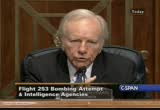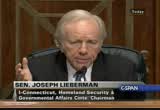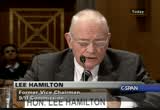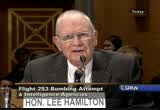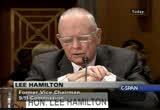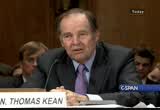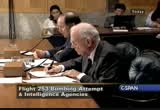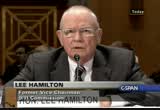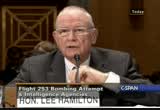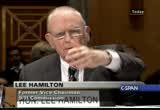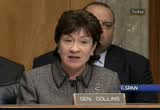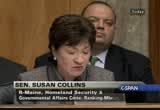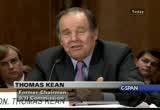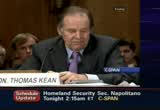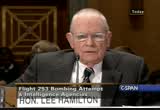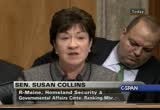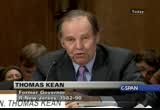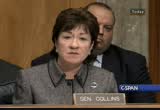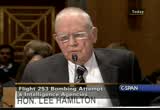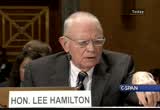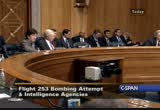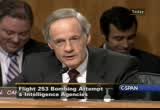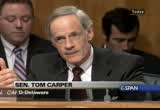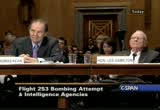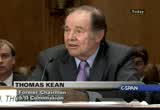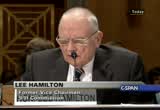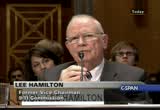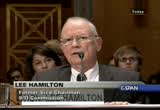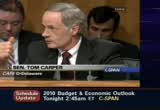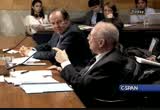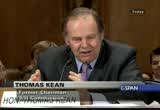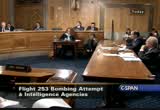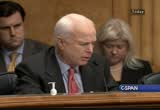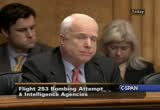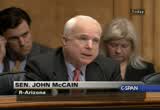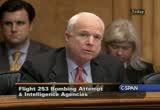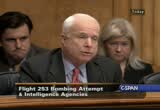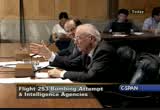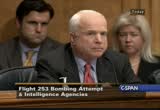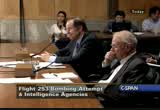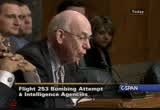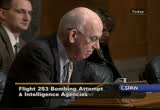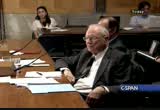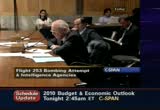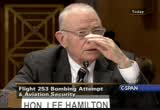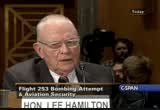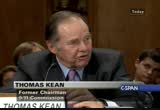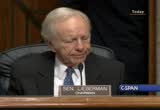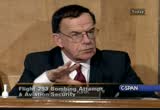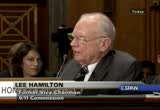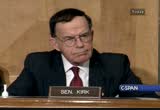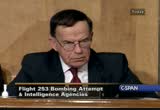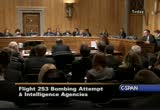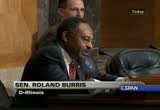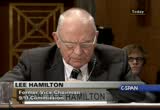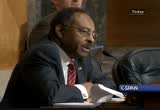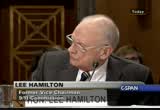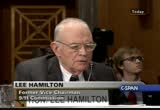tv Capital News Today CSPAN January 26, 2010 11:00pm-2:00am EST
11:00 pm
parliamentarians told us that but said there would be no funding for illegal aliens, he didn't know apparently -- obviously he didn't know that unless there's a requirement for identification in order to get the proceeds, then they are entitled to get the proceeds illegally here or not. he didn't know that or else he wouldn't have said that. i have a dream that one day the president's promises are going to be kept. i have a dream it's going to happen. and i know when the president told america eight different times on television that we're going to have all these negotiations on c-span. i know some day we're going to have all those negotiations on c-span.
11:01 pm
i have been trying to find out where the negotiations are going on so that we can have some true transparency and just -- and it was a great idea when the president said it. so that people all over the country can see who's negotiating for them and who's negotiating for the pharmaceuticals, who's negotiating for the insurance companies, who's negotiating for the plaintiffs' lawyers and aarp and standing on the side of the retired folks. we work able to see all of that. it would be transparent. the president, when i heard him saying that over and over again on television throughout the presidential campaign, i thought that's not a bad idea, that's a good idea. we'll make this totally transparent. even though i'm a republican, the president had a good idea. we have to give him fault, too. once he got elected, we need him
11:02 pm
to follow through and the american people like those ideas. if you go back and look at the exit polling data from 2008, november when the president won, indications are that 2/3 of the people in america said they voted for president obama and jobs and the economy was the number one issue. . 10% said health care was a big deal for them, health care reform. so i think he misread the results. people wanted jobs assistance, get jobs going, we know that 70% of the jobs come from small business, yet his stimulus bill provided less than 1% in loans in assistance for small business. he told america, this is going to create infrastructure, might as well do that. and turns out less than about 7% of that bill went for
11:03 pm
infrastructure. so i think it's important that when the president has a good idea this body follow through whether the president wants to follow through or not and this should be transparent and open. the 40 bills that we have as solutions and great ideas to hipping reform health care -- helping reform health care, because we want reform, we need reform. those will be listened -- they ought to be lisped to. there are some great ideas. one of them would be complete transparency and that's one of the things we want people to pledge. that you need transparency, the president was right when he was a candidate. he hasn't been right on that point since he's been president, but he was sure right as a candidate. and you look at the declaration of health care independence that we hope that lots of folks will sign tomorrow, but transparency is a critical issue. now, when you have a health care system where the big insurance
11:04 pm
companies, blue cross or aetna or any of them, where they get one really, really cheap price and the government pays a small amount, but if you come in and pay cash because you're a hard working lower middle class person that is struggling it to make every dime and to make every dime stretch and then you come in and you pay several times what the insurance company or the government pays when you're paying cash, system's upside down. it needs reform. and we do need to say, as candidates, -- as candidate, now president said, you got to have transparency, you got to see who's selling out whom. and so if there were a group that said, we're for retired persons and yet they didn't care what their members said and they were losing members right and
11:05 pm
left who were dropping their dues, but you found out they make a lot more money from selling insurance than they do from people paying dues, and they're getting a special deal and have millions more buying their insurance, then you would have some idea and then also maybe negotiate that their executives will not be under the same pay cap that most other executives under the federal insurance exchange are part of, people would notice that before watching it -- if they were watching it on c-span and they might -- anybody might get upsaid at anybody saying i'm representing retired persons publicly but in negotiations they cut deals with executives and not for the retired people. those are the things that need to be brought out, those are the kind of things that i know folks tomorrow, when they sign the declaration of health care independence, will be thinking about. you need transparency, you need accountability and oversight. and one of the things we saw with the madoff scandal, with the credit default swap scandal,
11:06 pm
with the a.i.g. overextending on selling those, goldman sachs selling their souls in with a.i.g., and then their former chairman getting them the massive bailout so they could have the biggest, most healthy profiting year in history this last year, all these kind of things going on, you need transparency and you need somebody standing up for the people. you need reform and the government should be about oversight, it should be about making sure there's a fair, level playing field and then the government doesn't play, they referee. we don't need them as players, we need them as referees and that is an obligation this body has foulen down on badly -- fallen down on badly in the preseason years and it's time we got back to it. those are things that need to be part of reform. the government should be about making sure people play fair, not being the bully player on the field that muscles everybody else off of it.
11:07 pm
those are the kind of things we need to be about. and we when you think of the -- and when you think of the things that have been represented and things that turned out to be true, people were told, well, this group came out with a study that said, if you're between 40 and 50 you shouldn't, and you're a woman, you shouldn't get a mammogram, and then they're told, oh, oh, they get to finding out, gee, if this bill passes, what that body just said is going to be part of the law and if you're 40 to 50, you don't get a mammogram. how many women have had their lives saved because they were able to get a mammogram between 40 and 50? and they found that little tumor only while it was still localized at a time which they were allowed in the united states to have a 98% chance of success and no cancer at five years, whereas in england where they have the socialized
11:08 pm
medicine that some of our friends across the aisle are trying to drive us to, they have about 20% less success and about 20% more die of cancer. they don't need to, if you let them have the mammograms when they need it. and those are the kind of things they need to come out. people need to know those. i yield back to my friend from iowa. mr. king: reclaiming my time. i thank the judge from texas. on the transparency side of this discussion, too, to broaden that out, madam speaker, when i addressed transparency, i'm speaking of two things. one is transparency in the negotiations, so everything is out there in sight in, and the other is transparency -- sunlight, and the other is transparency in billing so people know what's being paid for in health care services. but the part about negotiations that's so important, if they took place on c-span, out in the open, out in the light of day, if it is a big negotiating table that's there and your income's -- and here comes big phrma and here comes aarp, here's the
11:09 pm
health insurance companies, here's the doctors sitting over here, the patients, i'd like to think they'd have a place at the table, but i'm not sure just what entity speaks up so well for them, but as -- here's how a piece of legislation gets passed in this congress today. this is what happens. you think of the scales of justice, lady justice blindfolded, justice is blind, and here is balancing these scales of justice, that's what i see. there's an image in that, that image of justice and equity, i'm reluctant to use the word fair, but in legislation it works out this way. it's kind of a scale and somebody comes up with a bad idea. let's just say it's cap and trade or it's socialized medicine. they put all their ideas over here and, clink, here's the way the scale sets. all the bad ideas weigh it down. and then people start to say, well, wait a minute, i have a couple ideas that aren't so bad. let's take them off the table,
11:10 pm
put another idea in over here that you think is a good idea and then it starts to weigh a little bit. you don't see that scale move, it's still sitting there. then one large entity after another starts to come to a conclusion that passage of this bad bill is inevitable. so they take away their opposition to a bad bill and they begin to negotiate for their own carveouts and exemptions in a bad bill, so it damages everybody but them. and when they get their carveout, the political capital over here that is on the no side either goes to neutral or over here on the plus side because they've agreed to support a bill now because they got their exemptions so they're not affected by the bill. that might be -- it might be the florida exemption for medicare advantage or the $11 billion in clinics in maine or the louisiana purchase or it might be exemptions from executive pay controls in big phrma, it could be anything. it will add and add and add over
11:11 pm
on this side until all of this no political capital, all who knew it was a bad idea what it began, enough has moved to the plus side, to neutral, where if you put that final little weight on the skile, i like to call it the straw that breaks the camel's back, clink, it goes over this way. now there's enough support to pass a bill and that's when they ram it through and they don't let you up for air because they're afraid they'll lose votes . when that little moment comes, when they think they've got the votes, it comes through and that's why, that's why the united states senate was doing business for three constant weeks without a break and that's why they were doing business on christmas eve, to pass socialized medicine, with the 60-40 majority on december 24, christmas eevek, because they finally stacked the scales to the point where, clink, it would go over on the side where they could barely pass the bill. that's what they did. if those kind of negotiations are taking place out in the open where the american people understand it, they would be
11:12 pm
revolted by the concept of how this is business, how very little of it is discussion about what the best policy is for america and how much of it is a discussion about how you get the spoil of this group or that group or how you leverage to get the vote of a member of congress or united states senator. instead of evaluating the policy and stepping back and looking at it objectively and coming up with new ways to make something right for the american people, it becomes a political equation. if we could get it out in the sunlight, we could get rid am solve -- rid of some of those political equations we could get it closer to right for the american people. that's why transparency matters so much. that's why c-span in those negotiation rooms would matter so much. that's a very big part of this declaration of health care independence and i'm proud to be a part of it and i'm looking forward to our conference tomorrow and i'd be happy to yield just a moment to the gentleman from texas. mr. gohmert: i understand we just have one minute left, but i appreciate so much mr. king from
11:13 pm
iowa taking this time to point out what we need in the way of health care reform. it is the massive 2,000-page monstrosity. it's true transparency, it's true accountability and i appreciate this discussion with my friend from iowa tonight. mr. king: reclaiming my time, i thank my friend from texas for being up late at night and coming down here. when you have a friend that will stand with you like judge gohmert, in the end, we can, i think, together do some good things for the american people, madam speaker. and so we'll be working to get to that point. we want to empower an open and accessible marketplace for health care choice and if we're going to do business now, the rules have changed. our new rules for the road, these are the new rules for the road, and we're going to find out what people are serious, if they're ready to address lawsuit abuse, the people that -- the speaker pro tempore: the gentleman's time has expired. mr. king: advocating for socialized medicine, if they're
11:14 pm
ready to address lawsuit abuse, we're ready to do business. if not, there's a new sheriff in town. thank you, madam speaker, i yield back the balance of my time. the speaker pro tempore: the gentleman yields back. for what purpose does the gentleman from iowa rise? mr. king: i move the house do now adjourn. the speaker pro tempore: the question is on the motion to adjourn. those in favor say aye. those opposed, no. the ayes have it. the motion is agreed to. accordingly, the house stands accordingly, the house stands adjourned until 10:00 a.m. >> in the house today, members passed a bill to increase funds available for u.s. citizens affected by the haiti earthquake. there are an estimated 45,000 americans returning to the u.s. to get help. this bill passed yesterday, and now goes to the president. the house will be looking at
11:15 pm
facilities and a measure to establish a historic site in the u.s. virgin islands. at 9:00 p.m. eastern, the house hears from the president. live coverage of the u.s. house when members return here on c- span. house majority leader steny hoyer today outlined his party agenda in congress. he talked about the budget priorities, health care, and the president's state of the union address. his remarks are next on c-span. after that, in homeland security hearing on the attempted christmas day bombing. it -- a homeland security hearing. and later, we will hear from doug elmendorf. >> this weekend on c-span2's "book tv," vali nasr, andre
11:16 pm
11:17 pm
news and the president of the national press club. we are the world's leading professional organism -- organization for journalists, and we provide informative information. for more information on the national press club, please visit our website at www.press.org, and on behalf of our members worldwide, i would like to welcome our speaker and our guests. i would also like to welcome those who are watching on c- span. after the speech, i will ask as many questions -- answer as many questions as time permits. just as congress returned to session, there was a stunning upset in massachusetts. republicans scott brown's win leaves everyone wondering what is next. today, we welcome to the press club someone in a unique position to help us sort out that question and others, house
11:18 pm
leader steny hoyer. congressman hoyer manages the house floor and schedules the bills that will consider -- receive consideration. he was elected in 2006 and is currently in his 15th term in the congress. this morning, the majority leader will look ahead to the 2010 congressional agenda, which he says will emphasize job creation and to visit reduction. congressman of warrior. -- hoyer. [applause] thank you so much, congressman. i am pleased to be here. thank you very much for your introduction. this is my second year in a row that i have had the opportunity to discuss as we move into a new session, both the prospect but also to look back on the first year of this congress. when president obama spoke to the democratic congress this month, he took a moment to remind each of us how and why we
11:19 pm
were called to public service. we were willing to stand up in the public square, was loss, risk embarrassment, because we knew in our hearts that something was not right, -- which costs -- risk loss. this is a part of public service. whenever we see that our ideals are not within reach, artest is whether we can turn our frustrations into something constructive. whether we can be passionately positive, if you will. and that is especially the case in 2010. congress begins a new mission as we gather to hear the state of the union address. this is a time of economic pain, pain for millions of americans, and fear for their futures, and in 2010, many expect that economic pain to be translated into political pain, perhaps for
11:20 pm
democrats, perhaps for all incumbents. that is what we saw in massachusetts. democrats did not share america's economic urgency. in my opinion, we would deserve to lose more seats. however, that is not the case. when i look at the members of our caucus, i see the urgency every day in the debate, in the eyes of our members, in their stories about their constituents every weekend. they talk to them throughout their communities. as we took our oaths of one year ago, we knew that things were not right in america -- when we took our oaths one year ago. families forced to leave their homes we saw it in small businesses laying off workers in the face of falling sales and rising health-care bills. we knew things were not right
11:21 pm
when our middle class had been running just to stand still for over a decade, and we knew that something was not right in a political culture that thrives for too long on easy choices, on the philosophy of deficits do not matter. publicly or personally. the entitlements, wars, and tax cuts for the privileged, all paid for with borrowed cash to be paid back by our children. for six years, a republican colleagues had an unprecedented chance to put their ideology into law, and they did, and they drove our economy into a ditch. that failure is a fact, and we have to learn from that fact if we want to do better, but placing blame is not the point, because america's recovery is now our responsibility, a shared
11:22 pm
responsibility of both parties and a test on which we should be judged. democrats have accepted it. my fear is that republicans should but have not. we accepted responsibility went weeks into president obama's term, we passed the american recovery and reinvestment act, a plan supported by economists across the spectrum, premised on the idea that when consumers and businesses are justifiably afraid to spend in a recession or cannot spend it in a recession, the government has to pick up the slack. the recovery act passed without a single republican vote to, just as president clinton's economic program in 1993 passed without a single republican vote. that policy, however, helped lead to the best economy this nation had seen in 50 years.
11:23 pm
as they did in 1993, the minority essentially a bet on the failure of our economy. indeed, they predicted it -- the minority essentially bet on the failure of our economy. pete sessions said they need to get over the idea that they are to sit in in legislation. -- that they are participating in legislation. despite a year of republican efforts to paint the recovery act as unsuccessful, many conservative economists agree that it has grown our economy and save and created jobs. a man from the american enterprise institute recently concluded that the recovery act helped to add about four percentage points to u.s. growth during the second half of 2009.
11:24 pm
that is progress, according to the nine -- that is progress. according to the nonpartisan budget office, it is responsible for jobs also. it has seen job losses decrease for more than 2 million during the last three months of the bush administration to a reduction of 200,000 in the last quarter of last year. from a quarterly average, it has gone and a 69,000 jobs lost. that is too many jobs -- it has gone, to 69,000 jobs lost. -- gone to 69,000. it assured that people would keep their jobs, protecting our
11:25 pm
homes and keeping our streets safe. it has cut taxes for 95% of americans. it has made loans to nearly 40,000 small businesses and funded over a 11,000 transportation construction projects, adding jobs as we speak. and thanks largely to the recovery act, our economy grew by 2.2% in the last fiscal quarter. that is its fastest rate of growth in 24 months, and the first quarter of 2009, by contrast, our economy shrank by 6.4%. that reflects an almost 9% increase in the growth of our economy. unfortunately, many of my republican colleagues, either out of ignorance or intent, ignore those improvements. we have seen progress, but still not success, as i said.
11:26 pm
democrats recognize that these results are not good enough, particularly if you are one of the millions of americans left jobless in this recession. that is why creating jobs has a at the heart of our past year'swork which helped -- our past year's woprk. -- work. democrats help people access credit, stopped credit card companies exploiting customers, extended unemployment insurance, and help families stay in their homes. in 2010, we can help families stay in their homes -- and helped families stay in their homes. in 2010, jobs and fiscal balance. that is why the house passed a jobs for main street act to invest in infrastructure
11:27 pm
projects, increase the availability of loans to small businesses, and increase emergency aid for families who continue to struggle with long- term joblessness. that bill, as you know, is pending in the united states senate. it is not on the essential to those making a good-faith effort to find work, but it has other things to it. some of the best ways to create jobs include building needed infrastructure. it is crucial to get this to the president's desk as soon as possible and to search out for the most innovative ideas to create jobs and strengthen the middle class, including those initiatives just laid out by the white house middle class task force. creating jobs is priority number one. at the same time, however, we
11:28 pm
must deal effectively with our exploding debt. in the last administration, fiscal and i'll turn a massive surplus into record deficits -- fiscal denial turned a massive surplus into record deficits. meanwhile, the country is rightfully worried that washington is spending too much money. democrat to get it, and we will do something about it. our country faces hard choices -- democrats to get it. we are working to pass strong pay as you go legislation which is, as we speak, being considered. because the pledge to pay for what we buy is a proven deficit reducer. for the same reason, president obama has announced a freeze on some spending, which will require us to list our top
11:29 pm
priorities and work even harder to eliminate wasteful spending, but that will not nearly enough. the single greatest contributor to our deficit is the growing cost of our entitlement programs, which is why i am eager to work with a bipartisan commission to tackle our long- term budgetary challenges, and that is also under discussion in the united states senate as we speak. even if it is ultimately created by executive order as opposed to statutory, the leadership in congress has pledged to bring its recommendations for an up or down vote. republicans are as concerned about the deficit as they said they are -- if they are, i hope it will participate and contribute their own ideas as to how to create ballots instead of sitting the process out as they have been threatening to do -- as to how to create ballots -- balance.
11:30 pm
unemployment and a slow economy are among drivers of our deficit. we cannot get our budget under control until americans are back to work and our economy is consistently growing again so that investment in growing our economy and getting to fiscal balance are one in the same effort. from the recovery added to the long debate on health-insurance reform. health reform has not been a distraction in these hard economic times. in fact, times like these show how vital it is needed. the ability to bring assurance of coverage and lower costs to working families and to individuals and to create some 4 million new jobs over the next decade, reform is a powerful response to economic security. which of us has not heard of a business unable to create a
11:31 pm
needed job because the health- care costs contribute to that? or the families pushed into bankruptcy? where seniors choosing between food and their prescription drugs -- or seniors? that is why democrats are taking time to find the best way to make reform a reality. as i see it, we have four options. the first, of course, concerns a bill. the second is to try to pass a smaller bill that will make some very modest improvements. assuming republicans want to work with us, of course. the third is to pass the senate bill as is, and the fourth is for the house to pass the senate bill, and both chambers to pass a bill to bridge the differences between the two bills, such as affordability and funding. all of these choices have pluses and minuses. democratic leaders are taking time to talk to our members about what they're hearing from their constituents and digest with some clarity the message
11:32 pm
the voters in massachusetts were sending. affordable, quality health care. it remains because every presidential can it in 2008 -- presidential candidate identified this. it remains because social security and medicare and medicaid were all attacked in their own time as the end of the american way of life and are now part of a cherished part of america. and it remains because in massachusetts, a state that has already adopted a similar health-care program, it was not spoken against.
11:33 pm
we are looking to create a clean energy jobs. we will push for final passage of wall street reform -- to create clean energy jobs. that bill will protect americans from some of the most abusive practices, keep taxpayers off of the hook for future bailouts. for the too big to fail firm and to safeguard our economies from another collapse brought on by wall street -- safeguard our economy. it goes without saying that if the majority ruled in the senate, america would be closer to energy independence, and the rules for wall street would be clearer, more definite, and tougher, but we know the majority does not rule.
11:34 pm
republicans have broken all-time records for the use and abuse of the filibuster, turning the senate from george washington's cooling place to wear our nation's most pressing problems, are simply put in the deep freeze -- to where our nation's most pressing problems are simply put in the deep freeze. this fall, we will challenge them to stand up, own their record, and offer something more than opposition. in 2010, republicans will offer a steady diet of negativity, by their own admission. republicans, quote, will attack democrats relentlessly. internally, republicans call it
11:35 pm
the 80/20 strategy, which means spending 80% and of the time whacking democrats and the remainder talking of their own ideas. the american people deserve a 100%. -- deserve 100%. unfortunately, it in this political environment, constructive republicans are the minority. in fact, my state of maryland is mourning the death of one such leader, a good friend of mine, who, while and loyal republican, was committed to bipartisanship and constructive solutions. finally, as we deal with our challenges at home, with jobs and fiscal responsibility, we must continue our vigilance against threats from abroad. the failed attack on christmas day reminded us of the persistence of america's enemies, and, indeed, the attack
11:36 pm
yesterday in baghdad did, as well. in afghanistan, president obama set in motion a troop increase intended to prevent that nation from reporting to a terrorist haven, and in iraq, december was the first month without american combat deaths since the war began, a hopeful sign as the united states begins to withdraw combat forces this year. as we speak, american troops are risking their lives around the world, and are terrorist enemies are working hard to undermine our security and safety, but the president's thoughtful decision making process and our efforts to build relationships with our allies of the sign of a wise and effective foreign policy at work.
11:37 pm
-- are the sign of a wise and effective foreign policy at work. these are the hardest economic times we have ever seen, for those of us who were not alive during the great depression, and this is the size of artest, as well. for those of us call to government -- and this is the size of our test, as well. can we show the people he sent us here and hope were praying for? -- worth praying for? and congress not afraid to look our fiscal future in the eye -- a congress not afraid to look our fiscal future in the eye, a country that holds wall street to account and hold ourselves to account as well, a country that
11:38 pm
is building again. it is a test america has seen before, and history can give us this much comfort. america has never failed. we intend to lead so it does not in 2010 either. thank you very much. >> and i thank you for your time, congressman hoyer. we will have time for several questions, so if you are here or watching on c-span, please submit what you wish. given that the president is going to be giving the state of a direct speech, what would you like president obama to talk about be on jobs and the deficit? >> i think there are other things to be focused on, and i think the president will. there are many component parts to building our economy and to
11:39 pm
keeping america secure and returning to fiscal balance. i am sure he will talk about energy independence. i am sure he will talk about health care, which is part of economic recovery. i am sure that he will talk about a future that is fiscally sound while nevertheless investing in and growing our economy, so i expect those to be the two main things, but i also expect him to talk about our national security, as i have, being vigilant in keeping this country and our people safe from those who would undermine our security. >> on president obama's spending freeze proposal, how practical will that be? >> i think the american people have made it very clear that they want us to focus on two
11:40 pm
subjects. they are very, very concerned about jobs and the economy, as they should be, but, second, they understand that both under president bush, who asked to pass the troubled assets relief program, known as the tarp program, and president obama, who was asked to pass the investment and recovery act, it caused us to borrow significant sums of money. they are concerned about that. they know we need to return to balance. they know their children will be adversely affected for generations to come if we do not get a handle on the finances. so they have asked us to look at both of these twin priorities and work towards both. in the short term, we need to build jobs, and in the long term, we need to balance our budgets.
11:41 pm
in the past and administration, the bush administration, there was $5.60 trillion of a surplus from their estimates that they inherited. that was not the clinton estimates. we turned that into trillions of a deficit when this administration took over. the freeze will be a constraint, but i think most of the members to which you refer understand that their public and they are committed to fiscal balance in the long term, and i think that they understand that we have to make priorities. the freeze will certainly give the congress the challenge to make a choice on priorities within those freeze numbers, and i think we will do that, and i think members will make it clear
11:42 pm
to their constituents that we are making progress on an item very important to their constituents, and i frankly think that will be politically helpful, too. >> you discussed some of your concerns with the use of the filibuster and the closure process. -- cloture process. >> we have had, as you can imagine, several discussions with senator harry reid and dick durbin. the sheer frustration -- share frustration. there are over 250 pieces of legislation. a majority of those passed with republican involvement. these are pending in the united states senate. there are frustrations. members of the house have worked
11:43 pm
hard on these pieces of legislation. i mentioned george washington's. was that the senate was to perhaps cool passions that would be enacted by a body elected every two years. the senate was originally representatives of states. they were elected starting last century. very rapidly over the last few years -- and both parties have affected this, but over the last four years, republicans in the senate have grown this to historic proportions in terms of utilization of a filibuster -- of the filibuster, by geometric progression, the numbers of time cloture needs to be an vote or
11:44 pm
voted upon. americans are frustrated by that. the majority rules. it is one thing to have a considered process. it is another thing to have a broken process, and many of us believe that the senate process is broken, and when i say many of us, i speak for many members of the u.s. senate, as well. there is this gridlock created by this necessity not to have a majority on a vote but to have some sort of a super majority -- supermajority. in fact, when you get over 55% of the vote, you think it is a pretty big victory. 59 percent of the vote in the senate, the senate still does not have its majority prevail. that is a system that cannot stand in the time of crisis when the american public expect and
11:45 pm
deserve more. >> could this mean a more aggressive use of the reconciliation process for passing bills? could they pass the health-care bill through reconciliation? >> the reconciliation process, first of all, it was adopted into the rules. it was adopted for the very specific purpose of making sure that the filibuster could not stop important action from happening. now, the reconciliation process, somewhat esoteric, -- there are only in narrowband of things you can accomplish with reconciliation -- there are only a narrow band. you must deal with the budget aspects of that policy. as a result, it is limited in its scope.
11:46 pm
the answer of your question is, could the reconciliation process be used to accomplish some of those objectives to allow the majority to rule, and the answer to that question is it could be. >> there are, of course, several questions that were submitted regarding health care. you talked about this as part of the economic and jobs program for the obama administration. it did take a lot of attention in the later sessions of congress, and i am wondering, was the health-care debate a distraction? >> well, let me first of all remind you of what i said. the congressional quarterly, and not steny hoyer or someone else, but the congressional quarterly called it one of the most productive in history, the session of congress. if you look at the actions taken in addressing the issues that
11:47 pm
president obama and the democrats in the last election said we would do, it was no surprise. we indicated in 2006 and 2008 we would address the issues. one of which was the economy. one of which was health care. one of which was education. among others. in fact, the house of representatives passed major pieces of legislation with all of those as we told the american people we would do. as you know, many of those issues are still pending in the united states senate. the senate is working on those. we are continuing to work on that. but i want to remind you. people ask me, was it a distraction to focus on health care? essentially after passing energy and on, within weeks, of
11:48 pm
president obama's taking office, we passed one of the most significant packages in history. this was to bring the economy back, to grow the economy, and let me remind you what i said in my speech. we went from all loss of about 650,000 jobs per month in the previous three months to the last three months, a loss of jobs about 69,000 jobs per month. to go from 650,000 to 69,000 is a big step forward. however, it is not success. what you want to do is go from of loss of jobs to a growth of jobs, and that is what we are going to be focused on very vigilantly, but i would reject the premise that we have not focused on jobs, and, in fact, i will and with this reminder. what was the last bill that was
11:49 pm
passed -- i will end with this. building jobs through infrastructure, maintaining police, fire, say to personnel, teachers, and giving substantial investment in two additional infrastructure, which creates jobs here in america -- and giving substantial investment to infrastructure. we are focused like a laser on job creation. >> one of the four priorities, approaches, that you outlined for health-care reform would be a more gradual, incremental approach. what might be some of the low hanging fruit that you think could get bipartisan support? >> our friends on the other side
11:50 pm
of the i have indicate that they are supportive of some of these things -- on the other side of the aisle. much of the bill is an integrated whole. that is to say, you need to include many more people in the coverage under insurance, spread the risk, bring costs down for individuals, and at the same time, affect reforms. this is said that americans are not worried about losing their jobs and getting insurance, because their child has diabetes or epilepsy or some other preexisting conditions, that they will not be bankrupted by no lifetime limits. they will not be bankrupt by annual caps, and their coverage will be adequate.
11:51 pm
much of those and another very significant reform is a 23-year- old will not be automatically kicked off of your policy. we will make it 26. some of those require a broadening, which is why we created an exchange dealing with affordability, which spreads the base and adds 30 million to 35 million into having access to affordable, quality health care. it is more difficult when you take out individual items. however, clearly, an exchange could be created. there is, i think, broad-based belief that we need to in power businesses to come together -- to empower businesses to come
11:52 pm
together. there are, obviously, smaller things you can do, but i think there are some things that we can work together on. the challenge is that we indicated -- as i said, every candidate running for president last year -- excuse me, 2008, spoke extensively about the need to have major health-care reform in america. that was not a partisan difference. there were partisan differences or individual differences within parties as to how you get from here to there. but the need to get to there, which is accessible, affordable, quality health care, something which almost all candidates agree on -- therefore, it is difficult to take small pieces
11:53 pm
and accomplish the objective, but it is not impossible, and insurance reforms are popular. there is real concern that insurance companies' exemption have given to the insurance companies -- a lack of transparency. as a result, higher costs to consumers. we think that could be dealt with individually. and there are other items like that. >> you made reference to congressional democrats taking a moment to understand the lessons of what the massachusetts voters were saying. what do you think the massachusetts voters were saying? >> i think the massachusetts voters were saying what the voters in 2006 and the voters of
11:54 pm
2008 were saying. we want you to change it. the elected democrats to lead the house and the senate. -- they elected democrats to lead the house and the senate. we were not able to change any of the economic policies. why? because president bush either threatened to or did, in fact, veto legislation, and we could not override a it -- override it. it stayed in place. so we had eight years of economic policy that we think did not work. americans were angry about it in 2006. they were angry about it in 2008, and, frankly, they remain angry about it in massachusetts and all over this country that we have not gotten to the place where they think we should be, and that is where we are not
11:55 pm
losing jobs and where the values of their homes are not depreciating but appreciating, where their savings accounts are going up, not going down. i pointed out to you that during the tenures of the bush administration, the value of 401k programs -- during the 10 years -- during the years of the bush administration, the value of 401k programs -- clinton, 226% yp. bush, 25% down -- clinton, 226% up. blame is not the issue. what is the issue is what works, what works for our families and our country. the only reason to look back is to see what works and what did
11:56 pm
not work. do what didn't work, and do not do what did not work. -- do what it did work -- what did work. they want to make sure we are focused on the needs of them and their families, on job creation, on fiscal responsibility, and growing our economy, and i think that's certainly, all of the polls i have seen indicate -- and i think that certainly, all of the polls i have seen indicate that. with senator brown's vote and mitt romney's signature, a plan very similar to the plan the united states senate put forward in terms of including people and have a responsibility to be involved in an insurance program
11:57 pm
covering health in america, so it is somewhat ironic that the state that has chosen and supports in the polling data a program similar to that proposed by the united states senate, that somebody would extrapolate from the vote in massachusetts a concern solely about health care -- a concern in massachusetts and in maryland and in minnesota and in montana. i am trying to think of all of the m's around the country. it is that their country is not working the way that they think it ought to, and they are experiencing the worst economic downturn in three-quarters of the century, which means that very few of them have any experience in the great depression. this is the worst of times that they have seen. they are expecting us to bring them better times, and,
11:58 pm
hopefully, the best of times. >> a concern for many voters in places like mississippi, michigan, missouri, and other places in the united states is climate change, an issue that the house dealt with last year that is currently before the senate. you spoke about an approach on health care. there has also been talk about this in the senate, where energy and climate change could be separate bills. is this an approach the house of representatives would be willing to take? >> i think i speak for all of our leadership. we want to move forward on this issue. there are two major issues that deal with this. first of all, critically important, its energy independence. america cannot be in a position -- is energy independence. we cannot be held hostage by the oil barons who do not wish our country owell.
11:59 pm
we cannot allow this to be solely in control of others across the seas. we need to be energy independence. what does that mean? that means we need to -- we need to be energy independent. as well, we need to go to a greater utilization, cleaner, more efficient, renewable fuels. all types of fuels, solar, obviously been one of those. geothermal is another. -- obviously being one of those. solar is another -- there is another. another issue, of course, of concern is the sustainability of our global environment. whether or not we are going to be able to sustain this global
12:00 am
12:01 am
>> in the aftermath of the financial crisis, there is still much public outrage against practices on wall street and the feeling that too big to fail and behavior has not been adequate. given that you have passed several measures and there has not been senate action, what could that house do on this topic, and when i did find time to do it? >> we could do it again. the house has acted. the house passed a significant
12:02 am
regulatory reform. i think the two major failures of the previous administration led by republicans was fiscal irresponsibility and regulatory problems. there were a lot of problems, but fiscal responsibility and the fact that we incurred great debt and bought a lot of stuff. we increase discretionary spending at twice the rate we did under the present administration, from 3.5% annually under the clinton administration to 7.5% under the bush and administration. the result was deficits, substantial deficits. remind me of the last part of that question. >> any additional actions they
12:03 am
could take? >> there adopted legislation to deal with too big to fail, with the irresponsibility, and we're going to continue to focus on that. there are other issues being discussed. paul volcker has made some recommendations that he wanted us to focus on, and the fact is we're going to work with the senate. we have already passed legislation and on regulatory reform, on being tougher, on large financial institutions, and we need to be tougher on those in the consumer community that would go deeply into debt as well. we could point the finger of fiscal irresponsibility -- irresponsibility at a sol. government went into debt. -- we could point the finger of
12:04 am
fiscal irresponsibility at us all. we all went into debt. we could not do that for all time without there being a consequence. that light went on in september of 2008, which is when all of us found out how deep the crisis was, and they started retrenchment, and that is when we went into the recession, so we have acted. we look forward to working with the senate, and if we need to act additionally two additional items others may recommend, we will certainly give careful consideration and act. >> currently, there are a sri pending free-trade agreements affecting jobs in places from maine to new mexico -- 3 pending free-trade agreements affecting jobs in places from maine to new mexico. how should this fit into stimulus efforts? >> i am of proponent of a placed
12:05 am
two of the pending free trade agreements. the one in south korea is the largest. my own -- one is formed in panama. trade is very controversial in both parts, and there is bipartisan opposition and support. the president indicated he is interested in going ahead with trade agreements. we need to continue to work on those. i believe america can and will compete with the rest of the world in open market. we need to ensure fair markets, fair access to markets by our manufacturers and service sector -- of those entities that
12:06 am
can do business overseas affectively if they are given a fair shot to do so, so i think we need to couple our trade agreements with the enforcement of existing trade agreements and new trade agreements to make sure americans are being allowed to compete effectively. the new director of government relations for general motors was in my office yesterday giving me a good piece of news. we have passed legislation that tried to give a fair shake to dealers that has been shut down. that legislation passed, and general motors decided not to appeal that, but to pursue the appellate process to make sure dealers were not treated unfairly. that is good news, but in course of our discussion, they're
12:07 am
selling twice as many automobiles in china than they sell in the united states. we would like to increase by a factor of two themselves -- the sales in the united states. the fact that we are selling so much in china relative to hear is good news. we need to grow that abilities to have access to markets, and when we do that, we will compete. i think the trade agreements are a component of continuing to raise our competence and understand we can compete but understand we need a level playing field to do so. >> what is the democratic caucus's plans for dealing with the bush era tax cuts? >> the president and the democratic caucus have
12:08 am
indicated we are strongly committed to the middle class working families not getting a tax increase, and our plan would be to sustain the present level. as i said earlier, in the recovery act we gave 95% of working americans a tax cut. in the debate now going on in the senate with reference to something we pass in the house, we allowed middle-class tax cuts to be considered a baseline. what that means in the english language as opposed to legislative jargon is that we can pass the tax cut without the necessity of offsetting them with additional revenues, and that will ease their passage, but it is our intent to do just that.
12:09 am
>> how will the congressional races be affected by campaign finance? and you anticipate corporate and union spending to be more than ever? >> i think the opinion was unfortunate and the allied essentially a century of policies supported by republicans and democrats and confirmed by many supreme court decisions. it was a 5-4 decision. i regret that decision. we're looking at ways to make sure big corporations and big labour cannot come in and in effect take it out on those who do not support their objectives. we think this undermines the independence of the political
12:10 am
system. we think it also empowers corporations that may have large investments from overseas. we will have to look at this and the ramifications of the decision, but perhaps involving themselves where they could not directly, but through a corporate and shinsei in the public life of our -- corporate entity in the public life of our country. we are going to look at this carefully. how do i think it will impact the short term? probably not a lot, but certainly over the long term it can have a great impact. long term i think corporations will be somewhat hesitant. one thing we may do is if they want to run ads they have to do it in a transparent way so people know which large corporate interest is running ads against the propositions of
12:11 am
the public can make a decision, as they do with an ad i ran for my opponent runs. they know who ran that ad and how much credibility it has given the purveyor. we're looking at them very closely. the chairman and assistance of the speaker has been tasked to look at this, and he is looking to see what options are available to us. >> we're almost out of time and we still have a question. before asking that, we have a couple matters to take care of. first, to remind of future speakers. on february 4, we have gary lauck. he will be discussing back to basics, a blueprint for export- driven job growth.
12:12 am
the secretary of agriculture will highlight the obama administration's priorities, and on february 12, the commandant of the u.s. coast guard will deliver his final address. we would like to present our guest with the national press club mug, the full extent of national press club gift-giving. >> if there is any reason to come to the press club other than getting this smug, i do not know. >> there are thousands. i would like to thank you for coming today, and our final question deals with the situation in heidi. there has been talk about granting work status to haitians who are homeless because of the crisis. given the u.s. situation and the controversy, how feasible is
12:13 am
opening our borders to these stations before congress this year? >> i certainly think we're going to be discussing that issue so we can engage in trying to help the haitian people who have experienced an extraordinary catastrophe of historic proportions. the quality of life that exists today is tragic, and the moral responsibility we have as a nation in my opinion is substantial. in that context, i think we have to look closely at the immediate relief on the ground. i think we are proud of members of our armed forces and civilian sector who have joined in. i do not know if i have seen a national news event where four
12:14 am
networks have observed for hours or three hours for coverage of a sudden -- of the subject as was done the other night when all four networks reserves time with no advertisements focusing on haitians and the plight of their people. not only are we going to focus on additional relief. we have been tasked with the responsibilities to overseas the interface on issues of relief, on issues of additional dollars, and as you know, we passed a tax bill last week which would save the contributions made this year prior to i think april 30 -- which would say the contributions made this year
12:15 am
prior to i think april 30 or april 15 could be deducted from taxes. we have already acted, and we need to take an assessment now. clearly, high unemployment in our country. they should people need to of a country that can sustain the of in the long run, but in the short run, i think we have to look at what humanitarian accessibility might be available for short-term stage. one thing we have done -- we have facilitated some adoptions that were affected within a few days based upon that humanitarian motivation, but i
12:16 am
think you're absolutely right. longer-term it can be looked at as all other immigration has to be looked at, for the sustainability of the united states. >> thank you, and thank you for attending this event. for more from the national press club, please visit our web site. thank you for joining us this morning. [captioning performed by national captioning institute] [captions copyright national cable satellite corp. 2010] >> we just heard from the house majority leader at the national press club. we spoke to a reporter for an update on congress. house and senate democratic leaders have been shaping their
12:17 am
agenda for the year. what is on their wish list? immediately, dated of the it. health-care bill, but that is on the back burner for a bit. i think they have decided people may not like congress dealing with health care right now, since they pivoted to jobs and the economy. right now, all eyes are on the senate while they try to come up with the job they can get agreement on to pass, perhaps as early as february. >> how would those proposals create jobs? >> the senate does not have an official proposal yet, but some of the ideas include tax breaks
12:18 am
for small businesses that would expand hours for workers. i know senator caseous talking about a tax break for companies that would create jobs with wages that would be up to $50,000 a year. but this one idea on the table. another would create green jobs that would appeal for a lot of people that are hoping to get climate change legislation this year that as fallen to the wayside, and there is a whole bunch of things. usually in the form of tax breaks for small businesses. the house already passed a bill, so the house is not doing much with jobs other than waiting for the senate. their bill would divert about $75 billion in money that was allotted for the wall street
12:19 am
bailout last year. and they would take some of that money and diverted to infrastructure investments and other aid for states, so that would create jobs. that is where we are in the house. all eyes are on the senate to see what they are going to do in coming weeks. >> you mentioned democratic leaders were shifting their focus away from health care legislation. what is happening with health care? >> right now, nothing other than talking. the leadership is talking, and they are getting together and trying to figure out where they can go from here. there seems to be diminishing support for the health care plan we were looking at in december, the one that would have created a big national health-care plan and which would have expanded medicaid pretty significantly, and that would have required a
12:20 am
mandate and potentially tax increases. a lot of members talk about a modest plan where they would deal with some insurance reforms like people excluded because of pre-existing conditions, ways to expand competition, perhaps by allowing people to buy insurance across state lines. for me they are much more modest proposals people are talking about now, but there is no official way forward yet, and it sounds like lawmakers in the house and senate really want to focus on jobs and the economy because that is what they are hearing from the electorate. that is what they want to deal with, and this is exacerbated by the fact that we're now in the year 2010 and there is an election in november, which is months away, so they want to focus on things voters are worried about, or the democrats are going to find themselves in
12:21 am
big trouble in november. >> thank you. up next, a senate homeland security committee hearing on the attempted christmas day airline bombing. after that you will hear from the budget office director and then kent conrad. after that, the ceo of the ford motor company. tomorrow morning we will talk to the maryland congressman about the midterm election. the representative holds --
12:22 am
heads the committee. after that, dennis johnson with president obama's state of the union speech. after that, u.s. strategy in iraq, afghanistan, and pakistan. this begins with the day's news, and tomorrow morning, timothy geithner testifies about the attempts to prevent the collapse of aig. at the time he was the president of the federal reserve board of new york. henry paulson will also testified. live coverage starts at 10:00 a.m. eastern on c-span 3. now a senate hearing with the cochairs of the 9-11 commission. tom keane and lee hamilton discuss security measures
12:23 am
following the attempted bombing on christmas day. this is an hour 50 minutes. >> welcome to this second in a series of hearings during which we will investigate the reforms passed by congress and the wakes of the attack of 9-11 are working and to examine the reforms in the light of recent attacks in the ongoing threat and what parts of what we have done earlier may need further reform so we can fulfill our responsibility to protect homeland security of the american people. i want to go back to last week's
12:24 am
first in the series of hearings before focusing on this one and say i very much appreciated the fact that all of our witnesses -- dennis blair, director of the national counter-terrorism center, and the department of homeland security, janice napolitano, all acknowledge mistakes were made with regard to the christmas day attack on the plane over detroit, and all three of them offered to work with each other and with this committee to make our existing multilayer counter-terrorism defense quicker to react and harder to penetrate. i thought admiral blair was especially forthright, and i thank him for that. my guess is his forthrightness has brought him some criticism and made him the target of some
12:25 am
displeasure, but it was the right thing to do because it was the way he felt, and he spoke in what he believed to be the national interest. he felt and he spoke in what he believed to be the national interest. it is self evident that our homeland security intelligence did not work as we on this committee, congressman hamilton, post -11 with of wanted those agencies to work. -- post 9/11 would have wanted those agencies to work. those agencies to work. @@@@@@@ @ @ @ @ @ @ @ @ @ @ @ @ none of the three witnesses were
12:26 am
consulted before the christmas day bomber was turned over to the criminal courts rather than to the military, were i believe he should have been held because he was trained to attack america by al qaeda. since our hearing, osama bin laden has boasted of al qaeda sponsorship of the christmas day attack on america, so while al qaeda claims credit of this attack, abdulmutallab, who i think we can fairly described as a soldier in al qaeda, and obviously not an american citizen, now enjoys a constitutional protection of an american citizen, including a lawyer who immediately counsel him to remain silent, even though he may have information that could protect the american people from another terrorist attack. on that could protect the american people from another terrorist attack.
12:27 am
to meet this is outrageous, a kind of alice in wonderland in turning the world on a sense -- in turning common sense on its head. i urge the authorities to turn abdulmutallab where he can be held as a prisoner of war, which he is, acknowledging with some certainty and gratitude that this means he will be held and given rights far in excess of what the geneva convention requires enemy combatants or prisoners of war be given. we will stay on top of this to make sure this mistake, the failure to consult with -- to decide how to handle abdulmutallab and the decision to turn him over to the civilian courts is ever made again.
12:28 am
i do believe our intelligence gathering analysis remarkably improved since the attack of 9/11. the sharing of intelligence is vastly improved. this is due in part to the judgment with us today. shares of the -- shares of thcsf the 9/11 commission. driving the changes that make the american people more secure today than they were during 9/11. that leads us in part to refer to the act i just referred to as the 9/11 commission act. it sounds a lot better above
12:29 am
saying the acronym. the fact is it implemented most of the bipartisan recommendations of the commission. governor kean and congressman governor kean and congressman hamilton have been unique on the they are testifying before us today in their current capacity as cochairs of the national security prepared this group. i welcome both of you, and i thank you very much for your service. your commission's recommendations were comprehensive, both in terms of long term actions -- we should take the blunt terrorist appeals and to stop their ability to recruit and also short-term actions we need to take to defend the nation against further attacks. one challenge revealed in our hearing was the overwhelming amount of information collected
12:30 am
by our intelligence and law enforcement agencies for analysis. it has been estimated that the national security agency alone collects on a daily basis for times more information then stored in the library of congress. it is hard to imagine, but that is how much that has been collected. i know they have been considering this, and i would be interested to hear their thoughts on how we can get their analysis so crucial information can be mined from the vast amount of data. we were saying the dots did not come together. i sink now the dots are coming together, but there're so many
12:31 am
billions of dots, the question is, how do we see the patterns to help at the end of a -- to help act preemptively? against our country? another question relates to the authorities that we provide in the national counterterrorism center in the commission act. bottom line question, do we need to give the dni additional authorities or do we need to push them harder to use the authorities they already have it? i know you have done some preliminary work on this and i look forward to the guidance that you can offer our committee as we go forward with this series of hearings. there will be a status report
12:32 am
and perhaps recommendations for legislation or further executive action. i cannot think you enough for your efforts to secure our nation against terrorism, particularly islamist terrorism. there is no sense of morality or respect to life. that is the challenge of our lifetime. because of your service, we're doing a lot better than we otherwise would have done in beating that challenge. senator collins. >> thank you. i do join you in welcoming our distinguished witnesses back to our committee. but for their efforts, many who are here today, we would not have accomplished as much as we
12:33 am
were able to. nevertheless, we are hearing these words today -- intelligence failures, calls for reform, lack of accountability, failure to connect the dots, testimony by governor kean and congressman hamilton. it sounds like deja vu all over again. but in fact, there are significant differences between now and then. when our nation was attacked on the morning of september 11, 2001, our intelligence community was hampered by an organizational structure that undermined unity of effort. it was led by director who had little authority over its various elements and of little incentive to put focus beyond the mission of the cia. it was burdened with the culture
12:34 am
that promoted parochial agency interest over the intelligence needs of a nation. the intelligence reform act of 2004 fundamentally change our intelligence community. working with the families of the victims and with our distinguished witnesses as well as the rest of the members of the 9/11 commission, this committee was able to pass the most substantial reforms of our intelligence agencies in more than 50 years. my favorite named for the bill is the collins-lieberman intelligence reform act. in the five years since this act became walaw, information "
12:35 am
has helped disrupt numerous terrorist plots. this includes two separate conspiracies. other success was made possible by the reforms this committee spearheaded in 2004, but standing alone, the law cannot accomplish transformation. at the end of the day, even the most powerful laws are just words on paper. they rely on the leaders in the executive branch to aggressively carry out authority they have been given, and to fight the war on terrorism, the president, the director of national intelligence, the
12:36 am
secretary of state, and other leaders must use the laws to their fullest extent. her leaders must use the laws we pass to their fullest extent. unfortunately, the terrorist attack at fort hood and the failed christmas day plot are stark reminders of what can happen when those authorities are not used effectively. let's just look at some of the authorities given under the 2004 law. the dna has the clear authority to determine requirements and priorities for the management and passingç analysis on dissemination of national intelligence. the initial analysis shows the dni failed to respond to the growing threat that al qaeda posed to the united states and apparently failed to target
12:37 am
sufficient resources at this threat. the intelligence reform act provides ample authority to insure the maximum availability to intelligence information within the intelligence community. intelligence regarding the threat posed by major hasan remains stovepipe at the fbi joint terrorism task force instead of being provided to the the fdepartment of defense o prevent that attack. the law directs the dni to disseminate the information that include intelligence integration capabilities. here again, the intelligence that may have allowed us to identify abdulmutallab as a
12:38 am
terrorist remained undiscovered in many databases. disseminated, those dots were out there. there were not disseminated, but they were not connected. the law provides the secretary of state with clear authority to revoke a visa at any time at her discretion. yet abdulmutallab's these that remained valid one aborted flight 253. the state department had already decided to question him about his ties to extremists. i would asked, how could he have been a threat to the united states in the future based on these extremist ties, but not a sufficient current threat to
12:39 am
caused his visa to be revoked? that defies logic and common sense. finally, despite the president's authority to hold abdulmutallab as an enemy belligerent and subject him to a thorough interrogation for intelligence purposes, the department of justice as we learned in our last hearing unilaterally decided to treat him as a common criminal, as an american citizen, advise him of his right to remain silent, and grant him a lawyer at taxpayers' expense. it is outrageous carnations top intelligence officials were never even consulted on this vital decision. senator lieberman and i introduced a bill last week to try to prevent that from ever
12:40 am
happening again. my point is that the president's must empower his senior officials to use every authority available to them to defeat the terrorist threat. doing so does not require action by congress. that is not to say that further reforms are not needed. correcting those problems is possible under the crime law. it is a matter of using the authority. they do not require a 60-day review or more studies. they should be implemented now. nothing less than the security of our nation hangs in the balance. thank you. >> thank you very much. i want to note members of the families of some of those we lost on 9/11 whose persistence
12:41 am
has not just matched those of kean of and hamilton and members of congress but surpassed it. it's just great that you are here. you're in the front row. we thank you and we will stick with it. if it wasn't for these folks, we never would have had the commission. if not for the commission, we never would have had the legislation. do you guys toss a coin as to who goes first? congressman hamilton, it is great to see you. welcome. >> thank you very much for inviting governor kean and myself to be with you. we are cognizant of the fact that were not for this committee, many of the recommendations of export 9/11 commission would never have been enacted. the committee has shown extraordinary leadership on
12:42 am
these questions over a period of years. i know that the country is safer and the country should be very grateful because of the work of this committee. we thank you for it. senator lieberman, i want to say you're exactly right about the families. this law would never come into effect if it had not been for them. governor kean and i have had a wonderful relationship and support from them. we are appearing today because of a bipartisan groups and our written testimony gives the membership of that group the name. i know their names. they are familiar to you. it is an extraordinary group of professionals that join tom and me in this review of the 9/11
12:43 am
commission recommendations. at the national security prepared this group, we have been studying the implementation of the recommendations. we are still pretty early on in that review. but we do have at least some tentative conclusions to present to you today. the christmas event and at fort hood, as well, give us the opportunity to make two important points. one is an obvious one and that is the threat from al qaeda and radical islam remains very strong. one of the members of our group, you know him by name, bruce hoffman, has observed that al qaeda it is on the march. all of us agree with that. we have expressed over and over our sense that the urgency on terrorism has been too low and
12:44 am
we have to reject complacency and recognize that we still can see a serious threat. it is not a reason for panic but a reason for a concerted effort. a reason for a concerted effort. the second it reminds us of the need for establishing the director of national intelligence and the national counter-terrorism center in the first place. we need to support these entities and build them into strong and enduring institutions. it is imperative in our view that the dmi and nctc be successful in their vital mission they have been asked to undertake for the country. we have been pleased your committee has initiated this series of hearings on how well intelligence reform has been implemented, and that is exactly the kind of congressional oversight we called for in the report. there has been a debate within
12:45 am
the intelligence community on the estate of intelligence reform and the effectiveness of the dni. the dni has been hobbled by endless dispute over size commission, and authority. we are concerned about criticism sometimes made about the growth of the bureaucracy, and we support an ongoing, vigorous re- evaluation of functions, but such a review must occur with recognition that the congress and president gave the dni a massive to-do list, a great deal of authority in the wake of 9- 11. it is not enough to say simply that simplydni bureaucracy it -- that the bureaucracy should be reduced. we need to take a look at the essential tax -- test and seek
12:46 am
to adjust accordingly. in recent months, since we have studied the effectiveness, we have come to preliminary conclusions. we have a lot more work to do, but we believe the dni has achieved a meaningful measure of success in its first years. it is a work in progress, closer to the beginning than the end of reform. since september 11, the nctc and other government agencies have repeatedly connected the dots repeatedly connectedn the dots and shared the information necessary to defeat the terrorist attacks. improvements have been made on this point of sharing the information. we continue to believe that sharing is not as prompt and as seamless as it should be.
12:47 am
many of the successes ofing dni have been -- of the dni have been dependent under the bush administration and the obama administration. we want to continue to look closely to make sure it has the authority to do its work. it is our sense of the success of the dni in the short term it will not rise or fall on whether we make additional adjustments to the intelligence reform and prevention act. that was a difficult piece of legislation to get enacted. it is on the books now. it will be the governing statute for a good long time. so you have to work with it. i think there probably are some ambiguities in the law. you could argue that is more a
12:48 am
failure of exercising the authority than ambiguity. for example, section 1018, capacity designed to ensure the chain of command will not be abrogated. raises some question of authority. there have been some problems resulting from that section. we hope those have been cleared or at least improved by the executive order 12333 put into effect in the final weeks of the bush administration. qthe greatest challenge facing dni relates to the authority and the role. from my point of view, i think from tom's as well, the burden is clearly on thew3 president to be very specific as to who is in
12:49 am
charge of the intelligence community, where final authority lies on certain matters. you need a strong dni as a leader. the person has to drive integration, which we all know is a massive task. at the same time, the dni's authorities must be exercised with discretio a in in consideration of the other intelligence agencies. you really do need eight discipline. the president's leadership is the key. it is crucial and it must be continuing. or we run the risk of mission confusion and decrease the prospect of long and lasting
12:50 am
reform that was recommended after 9/11. the ability to lead the intelligence community depends on the president defining his or her role and giving them the power and the authority to act. >> thank you very much for a strong and thoughtful statement. governor kean, welcome back. >> thank you, mr. chairman. we're all blogging are best to get this massive bill passed. -- we were all lobbying our best to get this massive bill passed. leadership has taken control in the senate. this bill will pass. so thank you. thank you very much for your leadership in that area and the incredible families of 9/11.
12:51 am
they were the wind in our sa ils of the commission. they are lobbying to make this country safer. every time i come here and see them, i just echoed leak and the committee in saying thank you so very much. -- i just accokeeecho lee and te committee in saying thank you. the greatest single challenge that rises is the urgent need to strengthen the analytic process. the president said there was a felony to connect the dots. we might have been able to connect disparate pieces of information. we are pleased the president asked the dni to look at this
12:52 am
information. the dni is properly situated to assume a leadership role in applying the most rigorous standards to the analytical tradecraft. congress gave the dni the resources it needs and the ability to recruit and to keep the very best people available. judging the sources of potential tax problems. the president's review has shown, we had a strategic sense that al qaeda was becoming a threat. we did not know it progressed to the point of launching individuals. we collect and of enormous amount of intelligence. we need the very best people to sort it through but taking it
12:53 am
and making a decision as to, where is the next attack likely to come from? what is happening out there? you have talked about more information coming in the library of congress. it is incredible what comes in every day. in this age, we are collecting more information than ever before. how'd we understand it? how do we integrated? the dni needs to deal with information overload. they can do a better job of pushing information to the right people. welcome president obama's order to distribute reports more quickly and more widely. we can better sort through massive amounts of information to make sure the right people are seeing it and seeing it in
12:54 am
time to make a difference. the technology we use must be constantly upgraded. it must be properly placed so better analysis can occur. we have heard a number of times back five years ago before the commission that the analysts were sometimes treated as second-class citizens. hopefully that is not happening today. but these people are probably if not the most important, one of the very most important people in the whole community. we do everything we can to support them, too shy of their professionalism, and to get the best of them to stay in government. a second lesson from the christmas attacks reminds us of the importance of eliminating terrorist centuries. we found that the attackers from 9/11 benefited from the command structure that existed in
12:55 am
afghanistan, but commission placed great emphasis in prioritizing actual potential terrorist sanctuaries. we recommended strategic strategies employed all elements of national power. the more we can keep terrorists insecure and on the run, the better off we are. we are fortunate that the attack on christmas day did not succeed. they remind us, let's look. they remind us, let's look. or are they developing@@@@@@raáv deepen our commitment to ensuring al qaeda cannot exploit those territories for attacks on
12:56 am
our homeland. then just a couple matters that are left over from our report. we have talked a number of times about balancing the need between civil liberties and national security, and we have to get that balance right. ties and national security. we have to get that balance right. it is absolutely important. we recommend a civil liberties and board located in the white house which would look at the implications, whatever laws are passed come from a civil liberties. of view. the board was staffed in 2006. congress further strengthen it in 2007. we have an independent agency outside the white house. the board held numerous sessions with the fbi director among others, on terror
12:57 am
surveillance, and other topics. çbut the board has disappeared. it has been dormant since that time. we have now a massive capacity in this country to develop data on individuals. the board should be the champion of seeing that it does not intrude on the privacy and civil liberties. we continue to believe that that board is critical to the overall functioning, and we urged president obama to reconstitute its come up to. its members, and to allow them full access to the information to perform will reconsider an essential function. let me give you one more leftover from the 9/11 report. when those of us who are citizens come down to washington
12:58 am
and want to find out about transportation or about lavar mental protection or education, we can go and we can hear from the various committees and participate as much as we can as part of our democracy. we can do so with intelligence. it is secret. and yet as we know, the functioning of the intelligence agencies is absolutely essential to this fight we now have. it will be essential in the future. the public cannot really get involved because of the nature of the information. in this area, which have congressional oversight. that is why we made such a point in our report of saying how thoughimportant with thought congressional oversight was. we use the word "dysfunctional."
12:59 am
that was not our word. it came from members of both parties on the intelligence committees. we have not seen -- we made some recommendations. congress decided not to pursue those recommendations. it is too important that congress' oversight be as good as it possibly can be. when we interviewed this director of homeland security, she made the same. better predecessors have made. they spent almost 1/3 overtimed testifying in this complex system rather than working to actually improve our overall security in this country. we also suggested that perhaps the intelligence committees have more
1:00 am
we point this out because we since it is so very important that congressional oversight insurers the intelligence community fax correctly. we would urge that you look at the issue again and take action to strengthen intelligence. thank you very much. >> let me begin by saying a man -- amen to what you have just said. congress is really quite effective in taking on some of the status quo, and notwithstanding the resistance of different elements of the intelligence committee, but existing agencies would push through national interest to achieve reform. the one existing institutions
1:01 am
that proved less willing to reform was congress itself, so you are absolutely right. . pt reforms that you've gone back to this morning in an uncharacteristic experience, we lost miserably. but i want to challenge you and i accept this challenge myself. i accept this challenge myself. let's figure out we can make another run at this because it really is important and it does hamper the conduct of our homeland security and intelligence community by those involved. there's no excuse for it except turf protection, frankly. i thank you for bringing that
1:02 am
up and let's come back to it. i think we'll do seven-minute rounds of question. someone has been kind enough to not run the clock. thank you. let me say that last winter, we noted five years of the post- 9/11 act. we decided in oversight review. it came after both the fort hood and the christmas day bombing spree we begin this in the context of that. the fact is as we try to pull back from those events, the reforms -- the experience we had worked to protect us. maybe we had some good fortune and some good luck. the truth is that there was not
1:03 am
a successful terrorist attacks since 9/11. but then in 2009, it seemed to was the pace of the attempted attacks against the nine states pick up. there were at least 12 better publicly known. there are others that have not been discussed in public. most troubling, up three attempted attacks actually successfully breached our homeland defenses. there was one in arkansas. the man walked into an army recruiting office and killed an army recruiter. major hasan at fort hood, and then the attempt on christmas day. i wanted to ask either or both of you to step back a little bit and give us your best judgment about what is going on out there? what happened to increase the pace of attacks?
1:04 am
is it just a loss of the sense of urgency? it's something different going on that we need -- is something different going on the way to respond to? >> senator, the immediate thought i have in response to your question is that al qaeda has changed. the 9/11 attack, as we all know, was a highly sophisticated effort. it took a lot of planning and a lot of people. it did not take a lot of money. it really was impressive from the standpoint of planning and execution. i think the attacks you referred to in 2009 have been kind of solo performances.
1:05 am
in some respects, that probably indicates progress, and it means that our aggressive actions with regard to al qaeda have been çsuccessful, at least in part. and is more difficult for al qaeda to organize the complicated attacks. but their intent remains. perhaps their capabilities have been diminished. i do not have any doubt at all that they are sitting there somewhere plotting how to get at us. they're going to do it anyway they can, with any capability they have. if they cannot organize an effort to fly airplanes into the world trade towers, they can get one person to get on an airplane and try to blow it apart. so our guard has to stay up.
1:06 am
i think secondly that our defenses and our offenses with regard to the terrorist threat have improved. we are a lot better than we were. that is no reason for patting ourselves on the back or complacency. but it is a fact. a lot of people in the government are very talented and they're working very hard to block these attacks. not just the federal government but in city and state governments, as well. we all know the efforts going forward in new york city. i think both factors are present. >> governor kean? >> traditionally, al qaeda used to talk about big things. after 9/11, they talked about doing something.
1:07 am
bin laden talked about a nuclear attack. there was one in britain where there were going to blow up the airlines. it does say something that they have been able to pull them off. now they are saying in a sense, let's try these smaller stuff. fort bin laden, if that was him on thatç tape, -- 4 bin ladefon to take credit, it chose they don't have anything else to talk about. now they will lose whatever they can because they want to show some success. >> i appreciate that response. it gives us something to think about. let's focus in on the dni. i think a lot of us would have guessed the toughest battles that the dni would have with the
1:08 am
defense intelligence community. if there have been battles, it would of been within the defense community. i think you raise reasonable questions about whether the dni has become too large. we give them a lot to do. bottom line, i want to draw from you what i assume from your statements is your position, that you have no second thoughts about creating dni. at my right about that? >> absolutely right. we believe they dni is exactly what we need right now. >> you raised questions about efficiency of spending money. i take it that when you talk about clarifying the mission, you're not talking about weakening dni. >> that is exactly right. we want to strengthen dni.
1:09 am
we're not talking about weakening it in any way. i must say i saw a chart to of thinking dni's office the other day. i was quite surprised at things they have taken on kirk is worth a quick glance. is this really necessary to be done by the dni? deliquescence can be raised by some of those efforts. they have a university. i do not know what that is. in this context, i do not know what is. i am not sure that is the job of the dni. i think all of that needs to be explored. we have no second thoughts. this is a great big, massive, it usually funded enterprises, the
1:10 am
intelligence community. you have to have somebody at the top of it with authority, or just is not going to work. that authority has to be accountable. somebody has to knock heads together to get over this mind set of, i can have the information, you cannot. and get outside the stovepipe and to force the integration of the intelligence community. that authority should be given in the dni. he cannot exercise it, no matter what the statute says, without very strong presidential backing. >> i agree. is it too early to evaluate president obama's relationship
1:11 am
with the dni? >> my impression is that the intelligence community is relatively new to the president. i think he began to receive intelligence somewhere along the campaign. senator mccain can tell you when that happened. my impression is that his instincts were probably good but he is still feeling his way. his preference may be -- he said i have appointed good people here. he has done some good appointments, i think. i do not think he has a firm grasp yet of the intelligence community and therefore i am pretty strong in my thought that he has to step been pretty hard here. or some of these tensions which have surfaced will have
1:12 am
exacerbated. >> ok, thank you. my time is up. >> mr. chairman, let me follow up on the. you just raised. the law is clear on who is in charge of the intelligence community. i remember the debates we had and how difficult they were in establishing the quarterback, the one person who was going to be accountable. and yet, in spite of what appears to be a clear legal mandate, the dni and the director of the cia still seem to be in gaged insignificant turf battles. in just the past year, reports indicate that fit white house has had to intervene in disputes over the cia's role in afghanistan, the chain of
1:13 am
command over covert action, and the designation of the chief u.s. intelligence officer in overseas posts. those conflicts undermine the unity of the effort that was the gold that we shared and the very reason we created the dni. i am concerned by reports that the president may have inadvertently undermined the dni by sliding with the cia in these disputes. i have two questions for you. does the president need to more clearly indicated to the intelligence community that they dni is in charge and has his full support? second, do you believe that relationship needs to be further clarified in law, or is this a
1:14 am
matter of the law being adequate for the most part and the president needing to assert, to lay down the law, if you will? will start with you. >> we have always fought -- lee has been very articulate. the success of keeping dni will depend totally on the leadership of the president. in a way, this christmas day bombing did us a favor. i think we were not paying close attention to this area. that is understandable. we were talking about health care and cap and trade. we got distracted a bit. everybody got distracted and we were not paying full attention to this area. to this area. i think we have gotten a wake-up call.
1:15 am
i think the president in his statements in this area have been clear. i assume that the actions will follow the statements and he will pay strict attention to this problem, and no matter what is going on, his leadership will be exercised in this area. it is not going to happen without that. he has to stay on top of this and make clear what he believes the authorities are. and he has to step into a dispute right away. >> my answer to your first question is yes. i have tried to make that clear. the president does need to make it crystal clear to everyone in the intelligence community that the dni is in charge. but the extra -- but the exercise of that authority requires a lot of diplomacy.
1:16 am
that is a real challenge in how you exercise that leadership. but he should be in charge. you need a change in the law. that is a little tougher. in the short term, it does not make any difference. you're not going to change things -- the threat is out there now. the flaws have been revealed. you have got to deal with those flaws right now. -- the flaws have been revealed. in the longer-term, this is not the first whatever passed by the congress the may have had some ambiguity in it. it might very well be that you can refine it down the line. i do not have specific language to offer it to you today. i guess my central feeling is this is the lot and it will be that way for a while and you have to make it work.
1:17 am
>> last week i question the dni, the head of the national counterterrorism center, and our secretary of homeland security about whether they were consulted in the decision to charge abdulmutallab as a criminal and give him his miranda rights and give him a lawyer, which caused him to stop cooperating and answering questions. i was shocked to hear from each of these top officials that they were not consulted about a decision that had such implications for our nation's ability to better understand what may be further plots emanating from yemen. governor, what was your reaction to learning that our nation's top intelligence
1:18 am
officials had not been consulted about the decision? >> i was shocked and i was upset. it made no sense whatsoever to may. here is a man who may have trained with other people who are trying to get into this country in one way or another, who may have worked with some of the top leadership in yemen and we do not know the details of that. he may know about other plots that are pending. we have not found out about them. this is not just about prosecuting an individual. it is protecting the american people. things of -- decisions of this kind should not be made without the full import of the full intelligence community. the fact this was done without this kind of consultation was upsetting and shocking. i come from new york.
1:19 am
regardless of how we feel about whether the trial should be going on in new york, again, i gather the attorney general did not consult any member of the intelligence community before making that decision. we have to get our act together. . >> i agree with the governor's comments. i think you have to be guided by the principal. we need to get all the information that we can at of these people. that is the principal. what concerned me in the answers that you referred to was that there did not seem to be a policy in the government as to how to handle these people. that has to be clarified. i am not surprised the fbi
1:20 am
stepped in. they were there, but there has to be a policy and it has to be clarified. your legislation or your proposed bill, which as i understand it mandates a consultation with the dni, makes all kinds of sense to me. the intelligence director shirley should be consulted. but importantly, there must be a policy. one of the things we learned in the 9/11 commission is that we got into this question of interrogation -- this is a difficult business, interrogating people. you better be very short that you have got the right people asking the questions. we can have differences of opinion as to what kind of pressure ought to be put on a suspect. but interrogating people takes
1:21 am
patience and it takes skill, and you have to train and interrogator very carefully. of a high-value interrogation group. i do not think we have paid enough attention to the professionalism, if you would, of the interrogator. i am not acquainted with the details of that, but i hope it is developing highly skilled people who know how to interrogate. an awful lot is at stake in finding out all you possibly can. >> thank you. >> thank you, senator. briefly, one of the surprising things i have learned afterward is that there was a recommendation, and i thought an announcement of the beginning of the high value interrogation group. one of the witnesses last week referred to by the initials hig. as far as i can determine now, the group was never fully
1:22 am
operational, never set up. so it was not in the position to be called on to do exactly what we would have wanted it to do, as you have both said, after abdulmutallab was apprehended. thank you. the remaining senators will be called by an order of appearance in the hearing room. >> thank you. again, gentlemen, welcome. it is great to see you again. to for the wonderful work you continue to do for our country. i am going to ask the question later in my allocated time that will draw upon the great success and extraordinary leadership you provided for the 9/11 commission to see what we can garner from that experience. and as we prepared to move forward this week on legislation on a different commission, either statutory commission focusing on deficit reduction or
1:23 am
perhaps on a commission set up by executive order, but i want to bring out some ideas and ask for your thoughts and given the extraordinary success that we realize under your leadership. i would like to say that the road to improvement is always under construction. that is certainly true when it comes to finding ways to stop the bad guys from doing bad things to our country. when you're commission -- when you're commission completed its work and made recommendations to us, i know you made a large number of recommendations, dozens, the number is 46 in my mind. do you recall how many recommendations we made to us? it think they were all pretty much bipartisan. >> 70. >> do you recall how many we adopted? >> we have calculated that 80% of the commission recommendations have been
1:24 am
adopted in whole or in part. and i think in part covers a lot of ground, but most of those, and about 20% -- a little less than 20% out right rejected -- some may still be pending in one way or another. >> ok. one of you said earlier in the response to senator lieberman's questions call me mentioned it has been eight years since 9/11. every day terrorists are targeting us here and around the world, trying to create mayhem. and they have not had a whole lot of luck so far. it has been close. but they have missed opportunities as well. something that you have recommended and that we had adopted and that has been implemented by the executive branch is being pursued by our
1:25 am
men and women all over the world, something is working. it does not mean we sit back and rest. but when you look what we have done, including the things it you have recommended, that really seem to be working, what stands out for you? when you look good with you have recommended that we have passed and implemented fed does not meet last year, maybe it is incomplete, what might that be? what did you think is working well and is important? what are some areas that maybe we did not follow up and did not implement well? >> obviously, the creation of the dni and the congressional legislation of the nctc was the heart of our recommendation and was to force information sharing. black of information sharing was one of the things we found that probably lead to 911 as much as
1:26 am
anything else. -- lack of information sharing was one of the things we found the probably lead to 9/11 as much as anything else. that was key. i mentioned two areas before were recommendations have not been implemented. one is the civil liberties commission. we think it is very important and basically does not exist because the president never appointed its members. secondly, congressional oversight. we still do not believe, and we hear again from bipartisan people on both sides of the aisle that they are not satisfied in the intelligence committee that they have the ability to do the kind of oversight this country needs, and that is deeply disturbing. if they are not doing oversight, nobody is doing any oversight. it cannot continue to exist with this kind of problem. i could mention a number of others, but those are the most important. >> thank you. >> he is on the mark.
1:27 am
on the plus side, i would think the recommendations we made with regard to the intelligence community, including the dni and the nctc and other aspects, i would judge them broadly successful. not completely, but broadly successful. i think a lot of the recommendations we made in the transportation sector, watch lists can certainly be improved. we recommended that. better detection equipment, we recommended that. i have been a little disappointed in the slowness of the adoption of some of the detection of improvements of detection mechanisms. cargo screening and all those kinds of things i think are under way, taking a little more time probably than we want it to. but they have basically been approved. we had a whole chapter in the
1:28 am
book on the 9/11 commission on foreign policy recommendations on the question of how to deal with the islamic world. that was not so much legislative recommendations as foreign policy, and i think we have got a ways to go in implementing those because our relationship with the islamic world is a huge foreign policy challenge and will be for decades to come in all likelihood. i want to emphasize the civil liberties and privacy board. look, you have the capability to day of surveillance and intrusion into the lives of people that is incredible. with the government can learn about you today and all of these fancy technological devices we have got to intrude into private lives, and kate, we all support
1:29 am
it. we think it is necessary. but if you have an argument today in the bureaucracy between the security people and civil liberties people, i will tell you who's going to win the argument. it will be the security people every time. we picked up the paper the of the day and none of the fbi had been violating the law for five or six years. and it was not ever called to the intention of the inspector general. he finally found it up. the fbi, which is supposed to be sensitive to these matters. the point is here that you need somebody out here in the government that is checking everything that is done with regard to security and asking themselves, can it be done better with a little more respect for privacy and civil liberties? we all know the privacy and civil liberties are going to be invaded. you cannot walk to an airport
1:30 am
without understanding that, but i think we have to get stronger -- a group with robust powers to be a counterbalance on the argument for security. tom and i, i think all of our commissioners were on that. >> could take one more minute and go back to the other question. when i looked it commissions that have been extraordinarily successful, i go back to 1982. i know senator mccain had the opportunity to vote for those recommendations which have served us well. we have before us the idea of a statutory commission, and the proposal would save that most of the commissioners would be members of congress and it could
1:31 am
be just folks like you who have a wealth of experience. given the success of this commission, give this advice as we go through this equally important challenge. -- pick eight chairmen like tom kean. he was chairman. i was vice chairman. we knew each other by reputation bed did not know each other well. tom walks into the room. we're going to make these joint decisions. we will not hire anybody and will not fire anybody. we will not make any decision unless we do it together. >> it was said that one of the unfortunate things we have going for us was -- a think he's to put it, reform politicians.
1:32 am
>> i describe myself as a recovering governor. >> there's nobody in the commission, i do not think, with any interest in running for anything. and do not think anybody was looking for appointment of any kind. so our minds were clear. our agenda was trying to protect the country. that probably enabled us -- that fact probably enabled us to get over the kind of partisan -- it was a terrible time, and this is going into one of the most divisive presidential elections in our history. we started off with the republicans sitting here and a democrat sitting over here. the first, walked in, i remembered democrats in one corner. we walked into the room and basically said to break it up. after that, i said republicans will sit next to democrats and the other way around and will not meet again unless we have the kind of the seating arrangement. but it helps to have your mind
1:33 am
clear of any of the problems, so it can concentrate on whatever the task is, and not to care very much personally and tried to do the right thing. as a commission, we tried to do the right thing, and that was our mantra. we would argue about these things, but we would look for what the facts show and what the right thing is. >> thank you. that was very helpful. >> thank you for being so generous with the time. thank you. >> senator mccain. >> i want to thank our witnesses for their continued service for the country. especially, i would like to welcome the 9/11 families, without whom the 9/11 commission would never have come into being and these much needed
1:34 am
reforms being infected. i was struck that you said 80% of the recommendations probably had been enacted into law. on page 419 of the commission report, it says, strict and congressional oversight of intelligence and homeland security. of all our recommendations, strengthening congressional oversight may be among the most of gold and important. so long as oversight is covered by current congressional rules and resolutions, we believe the american people will not get the security they want and need. it seems to me we have not implemented that very strong language that is contained in your report. is that accurate? >> unfortunately, you're totally correct. >> ines seems to me, mr. chairman, that we ought to go back at this. -- and then it seems to me that we ought to go back at this. we should do it until such time
1:35 am
as we shame our colleagues and to be more concerned about national security than they are about turf. i hope that the next opportunity, we will join in and try to push the changes that have been recommended by the administration. would you say it is probably the most important of failure of all the recommendations that you made? >> yes, i would. and members of the congress were on our commission and they all said and we proposed this that it was the most of the cold organization to be implemented. we said that it was the right thing to do, and everybody agreed, so we went ahead. >> i will ask the 9/11 families to go into battle again. if anybody can get it done, you all can, and i thank you. i was disturbed by the events in some things revealed in the hearing that the chairman and the co-chairmen held a short
1:36 am
time ago. a 50-minute interrogation, a decision made to give the christmas bomber the miranda rights and a civil trial. i only know press accounts. i do not have classified information on this individual. he was talking. there had to be a pause, and when he woke up, get a lawyer. understandably, the lawyer did what lawyers do. that is their job. i am not blaming the lawyers, but how we could have made a decision the way we did brings me to a larger issue. and that is the whole issue of the disposition of detainees. guantanamo bay, the trials, under what circumstances -- and it seems to me that the overall
1:37 am
policy is so -- the word may be incoherent, but certainly not coordinated. i guess there is a more kind description. we now have kind of an ad hoc decision making as far as the treatment of detainees. we still have not resolve the issue of enemy combatants who we cannot bring to trial because of insufficient evidence, but yet, we know we cannot release them. we have learned that there is a certain percentage -- of various 10% to 20%, of detainees better back in the fight. including some in leadership roles. so dozens this argue for not -- so does this not argue for congress to develop legislation that addresses all these amorphous area as a of trials, of detention, of treatment of
1:38 am
this issue of any combat -- of enemy combatants that you cannot bring to trial but at the same time can not release? for example, an annual review of these cases. but so far, none of that has been translated, at least to a policy that members of congress understand. so senator lieberman and senator gramm and i are working on legislation to try to address this issue, and we want to work with the administration to prevent another situation has evolved with the christmas ballomber but also to resolve te -- resolve the existing issue. some will be tried in new york. some will be tried in guantanamo. some may be tried in other places. does this not -- does this
1:39 am
christmas bomber issue not focus the absolute requirement that we address this issue in the policy-making and perhaps a legislative way? >> i very much agree with your conclusion. these people present a real challenge for us within our constitutional system. the problem is you have got a detainee, you cannot prove a criminal charge against him, let us say. at the same time, he could kill you. it does not fit in the american constitutional system. and we have not figured it out yet. i think the most important thing you said was that you and senator lieberman and senator gramm are working on it. i am delighted to hear that. i did not know it.
1:40 am
i think we hear a lot about how government does not work very well today, how dysfunctional it is. this is been an area where the legislative branch and the executive branch have failed, flat out failed. we have had this challenge now for a good part of a decade or maybe more. neither president, bush nor obama, has dealt with it, and the congress is not dealt with it. i am delighted to know that you're doing this. i think it is a very tough bill draft. the important characteristic that is needed in the bill, however the details are any of got to look to lawyers who know a lot more about it than i do for the details, but the law has to be perceived as being fair. perceived by americans is being fair, whatever that may mean,
1:41 am
perceived by the foreign and international community as being fair. i think that is what you have to strive for. that does not mean you give them all the rights of the american citizen. i am not arguing that. but senator, i applaud the initiative. i think this is been a failure of the u.s. government as a whole to deal with this very, very tough problem. and i certainly wish you well on it. >> once again, thank you for your leadership. i cannot agree with lee more. >> thank you. >> too much, senator mccain. i appreciate your leadership on this. it has been very good to work with you and senator gramm. the choice for our country in deciding how to deal with terrorism suspects we take into incarceration is not a choice between applying the rule of law and not applying the rule of law. we are a country of laws.
1:42 am
it is a question of which rule of law. is it the rule of domestic criminal law or is it the rule of the laws of war? of course, i believe it is the second. but that was a very important exchange. thank you. senator bennett, your next. >> to add very much, mr. chairman. i it -- thank you very much. i appreciate the dialogue and appreciate the witnesses and the important subject to have discussed. rather than go back over some of those, because i think the record is now clear, congressman hamilton, let me pick up on a comment he made. it may appear to some to be a somewhat smaller issue, but you raised it, and i have an interest in it. when you talk about the necessity for better detection equipment -- i spent a lot of time going through airports, as do we all, but i have personally
1:43 am
experienced the morhigher technology with respect to body imaging. we have one of those on a trial basis that the salt lake airport. i went through it without any bodily harm or any psychological embarrassment. no displays embarrassing fashion anywhere. i am drafting language and i plan to introduce it shortly, and it is legislation that
1:44 am
technology, the magnetometer and searching the bags, which is not very effective and quite interested and very slow. -- quite interested in very slow. i think we should get tsa to employ technology with the capability to detect plastic and liquid explosives, non-metallic threads, and so on. now -- by the way, i very much support what tsa has done with respect to privacy in these technologies, and we need to make sure that we go as far as we can to see to it that that is balanced as well. ok, we do that in the united states. now somebody gets on an airplane in yemen and transfers in amsterdam.
1:45 am
what kind of threat to do we have in the world of a)@ @ @ @ @ @ @ @ @ @ @ @ @ @ @ >> i don't think i know anything that has frustrated me more than to develop over a period of years adequate ticket -- adequate detection equipment. the most serious thing in my mind is the ability to detect nuclear materials. i don't think we have spent a lot of money at that. this goes back well before 9/11. but we still have not come up with it.
1:46 am
so i think that there has to be a crash effort, if you will, in research and development in the scientific community to develop better technology here. the hijackers got on those airplanes in at 911 with four- inch blade knives. they knew you could not get on with eight-inch blades. these people are very sophisticated about our vulnerabilities. and whenever we make a change, they begin to adopt -- they begin to adapt to it. so the technology has to try to keep out in front. i personally do not have any problem with the body images. i think they ought to be used. i am not that sure they would have caught our december -- stopped that incident. in other words, people have said to me that even with body imaging, he might have gone through.
1:47 am
but in any case, there clearly better than the metal detectors. our adversaries figured out a long time ago they have got to do something other than metal in order to cause problems. now the international problem is a very difficult one, exceedingly difficult. and i know our people have spent a lot of time talking to other countries about strengthening their procedures. i think we have to get to the place where we do not let people into this country unless they have gone through a security process that is rigorous, however defined. >> governor mccain -- kean. >> our biggest defense is not
1:48 am
technology in that area. it is technology in identifying bad people that should not get visas and get into this country. as you know, when you go to these centers, you can see that every person is getting on an airplane at that time heading toward the united states. that is probably the moment the best -- that is probably the best defense we have. the christmas day brombomber should have been on the no-fly list. i am for any technology we can have to recognize this. our enemies will be trying to get through our technology, and at the same time we have to upgrade our technologies. i think we should do that. it is the best defense we have. do not let the bad people get on the airplane to begin with. did not let them get visas. do not let them get to the
1:49 am
airport. do not let them even approach getting on the airplane to the united states. >> thank you. >> thank you very much. next we have senator kirk. i might try to go vote early and come back. if i am not back when center kirk finishes, then senator burris can go next. thank you. >> thank you, mr. chairman. thank you for your leadership and continuing oversight in this important matter. let me thank our witnesses for their selfless and patriotic service throughout your public careers. it has been inspirational to all who know and follow it. i also want to salute the families for their valor and persistence. some have worked closely with
1:50 am
senator kennedy on help for the victims. you deserve enormous praise and gratitude for your courage. my question basically goes to the impression of almost information overload. we have talked about it and you have recognized the need to recruit and retain analysts of the highest talent and caliber and to recognize their prominence in this whole dilemma. do you have an impression that, given the amounts of information, that there are sufficient or adequate numbers of analysts of that caliber that are dealing with this? >> my information, frankly, is not recent enough to make that conclusion. i know last time i was deeply involved in this, there was certainly not enough analysts
1:51 am
and not good ones. they were not promoted and recognized in the same way, and we were not attracting the best people. i hope that has changed. >> well, i agree with that. this is one of the things that the national security prepared in this group needs to look at. tom said in his testimony that it drove home the importance of the analysts, and that is correct. i do not know whether we have enough. i do not know whether the ones we never sufficiently trained i think it takes several years to produce an analyst. it is tough work. i mean, you're sitting there watching millions and millions of the banks of data coming across the screen, and 99.9% of it is useless. and then there is the knighted in there. so you have to have not only --
1:52 am
and then there is the nugget in there. you have to build into the system redundancy. i am not worried that if you have two different agencies of the government doing similar work with regard to analyzing intelligence. but i think the question you have raised is a very critical and needs to be followed up carefully. we need, congress needs, to give full support to whatever the intelligence community needs to get topline analysts. >> thank you. thank you both. the other aspect of this analysis of our intelligence, the vast volume that we have, is -- this is apart from detection technology. this is about the technology that helps analysts said the size, and a great, and read a pattern, if you will --
1:53 am
synthesize, integrate, and read a pattern, if you will. do you know if we really have the kind of state of the art technology that allows us to do that and share it with the various agencies, foreign responsibilities, domestic responsibilities? because it seems to me that grid, if you will, or that state of the art technology combined with the kind of human resources you both talk about is really the key to this whole puzzle. >> absolutely. i very much agree with that. i do not know the answer to the question, do we have the state of the art technology? i have a suspicion we do not. what i do know is that we've got to find the best people in this country on the question of data
1:54 am
management. i mean, you are handling data, and it has been cited several times that it is massive amounts, and you have to sort through that. i do not know whether those people are in the government or in the private sector today. but wherever they are, we better find them, and we better put them to use. >> that is correct. i remember when i was talking to president clinton when we were doing the investigation, and he pointed out that our data management was so inferior in government compared to the data management in the private- sector. he mentioned credit card companies and some other of its the had in arkansas that he said could have identified these people right away. and we just did not have that technology at that time. i hope we're better at it. i just do not know. >> thank you very much. thank you, senator. >> thank you.
1:55 am
i echo the comments of my colleagues in reference to your work. i am retired public official, but duty called, and i am back in it. you all indicated that you're not going back in it, and you are able to do great work for the country, which we appreciate. and to the 9/11 family members, i extend my heartfelt thanks to you for your persistence. i have not been able to read your report. as a new center here, in some general sort of questions. did you all take into consideration -- as a new center here, i have some general for the questions. did you all take into consideration information about homegrown terrorists? we hear about al qaeda and foreign services. did you take into consideration about homegrown actions? >> the 9/11 commission did not because it really was not within our mandate. but since the 9/11 commission
1:56 am
and the development of the the phenomenon of terrorism, it is quite clear that the home grown or the lone wolf terrorist has become a major threat and concern to the country. so yes, the national security preparing this group, we will be looking at that threats and seeing how we can improve our defenses against it. not all of the bad guys, unfortunately, are from abroad. we got a few year. >> you are right. >> i would simply agree with him. >> gentlemen, i just wonder, when you go back to the al qaeda situation now, what i tend to pick up through my basic information is that they are going to the chatter out through the various pipelines and to all our security agencies that is
1:57 am
misleading and misdirected. you would never be able to tell what is really in fact a possible threat. that is number one. number two, i understand that they're going to try to spend us into oblivion with costs. they will have a stretch to come up with every contingency to try to protect ourselves. the civil liberties will be coming. you have these actions that have taken place. the chatter is misleading. and the attempts to spend as into oblivion, all these various ideas, they will come up with something. they're going to tap as out eventually financially. do you have any comments on that? >> i bome quite
1:58 am
clear that that approach that you're mentioning, trying to make us spend more and more and more by way of defense, is part of their strategy. and maybe it is even a successful part of the reair strategy. maybe it is one of the reasons they think they are winning in some areas. a dramatic example is 9/11 itself. what did we figure the cost? a huge amount of money. >> very modest amount of money. >> think of all the changes that have occurred in america since 9/11. what your question raises for me, senator, is one that does not ordinarily come into the debate on terrorism, and that is the question of cost effectiveness.
1:59 am
the security people can come up with than in was number of ideas with than in was number of ideas as to what you should do, and and you really find it difficult to argue against any of it because it has truth to them. i think as we move along and as our costs continue to rise, the question you raised will become much more part of the debate -- is it cost-effective? now obviously, you want to air their on the side of security -- err there on the site security. i do not know how much we spend on security today. if there is a calculation, i have not seen itut
179 Views
IN COLLECTIONS
CSPAN Television Archive
Television Archive  Television Archive News Search Service
Television Archive News Search Service 
Uploaded by TV Archive on

 Live Music Archive
Live Music Archive Librivox Free Audio
Librivox Free Audio Metropolitan Museum
Metropolitan Museum Cleveland Museum of Art
Cleveland Museum of Art Internet Arcade
Internet Arcade Console Living Room
Console Living Room Books to Borrow
Books to Borrow Open Library
Open Library TV News
TV News Understanding 9/11
Understanding 9/11